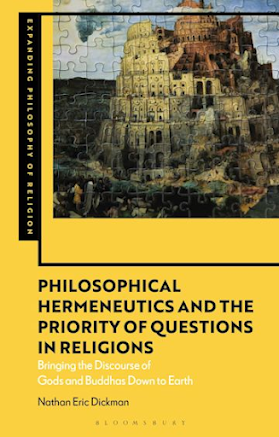Nathan Eric Dickman
Philosophical Hermeneutics and the Priority of Questions in Religions
Bringing the Discourse of Gods and Buddhas Down to Earth
London: Bloomsbury 2022, 224 pp., index
ISBN 9781350202146
Verlagsseite / Publisher’s Homepage
Contents & Extract / Inhaltsverzeichnis und Leseprobe
Detailed Contents & Abstracts / Detailliertes Inhaltsverzeichnis & Abstracts
Editor’s information
Buddhas, gods, prophets and oracles are often depicted as asking questions. But what are we to understand when Jesus asks “Who do you say that I am?”, or Mazu, the Classical Zen master asks, “Why do you seek outside?“ Is their questioning a power or weakness? Is it something human beings are only capable of due to our finitude? Is there any kind of question that is a power?
Focusing on three case studies of questions in divine discourse on the level of story – the god depicted in the Jewish Bible, the master Mazu in his recorded sayings literature, and Jesus as he is depicted in canonized Christian Gospels – Nathan Eric Dickman meditates on human responses to divine questions. He considers the purpose of interreligious dialogue and the provocative kind of questions that seem to purposefully decenter us, drawing on methods from confessionally-oriented hermeneutics and skills from critical thinking.
He allows us to see alternative ways of interpreting religious texts through approaches that look beyond reading a text for the improvement of our own religion or for access to some metaphysically transcendent reality. This is the first step in a phenomenology of religions that is inclusive, diverse, relevant and grounded in the world we live in.
Deutsche Erläuterung
Buddhas, Götter, Propheten und Orakel werden oft so präsentiert, dass sie Fragen stellen. Aber was sollen wir verstehen, wenn Jesus fragt: „Wer sagt ihr, dass ich bin?“, oder Mazu, der klassische chinesische Zen-Meister, fragt: „Warum sucht ihr draußen?“ Ist ihr Hinterfragen eine Stärke oder eine Schwäche? Ist es etwas, wozu wir Menschen nur aufgrund unserer Endlichkeit fähig sind? Gibt es irgendeine Art von Frage, die eine Kraft ist?
Anhand von drei Fallstudien zu Fragen im göttlichen Diskurs auf der Ebene der Erzählung meditiert Nathan Eric Dickman über menschliche Antworten auf göttliche Fragen:
- den in der jüdischen Bibel dargestellten Gott
- Meister Mazu in seiner aufgezeichneten Spruchliteratur
- den Jesus, wie er in den kanonisierten christlichen Evangelien dargestellt wird
Der Autor betrachtet den Zweck des interreligiösen Dialogs und die provokative Art von Fragen, die uns absichtlich vom Zentrum wegzubringen scheinen. Dabei stützt er sich auf Methoden der konfessionell orientierten Hermeneutik und Fachkompetenzen des kritischen Denkens stützt.
So ermöglicht er uns, alternative Wege der Interpretation religiöser Texte zu sehen, und zwar durch Ansätze, die über das Lesen eines Textes zur Verbesserung unserer eigenen Religion oder für den Zugang zu einer metaphysisch transzendenten Realität hinausgehen. Dies ist der erste Schritt zu einer Phänomenologie der Religionen, die umfassend, vielfältig, relevant und in der Welt, in der wir leben, verankert ist.
Author: Assistant Professor Nathan Eric Dickman, University of the Ozarks
(Clarksville, Arkansas, USA)
Zum Kontext
- Christoph Elsas: Interreligiöse Verständigung
im Horizont von Religionswissenschaft, Theologie und Mystik - Perry Schmidt-Leukel: Die inneren Ähnlichkeiten der Religionen –
Chancen interreligiöser Theologie
Table of Contents / Inhaltsverzeichnis
Preface
Introduction: Questions in Divine Discourse
Part I: Elements of a Hermeneutic for Interpreting Divine Questions
1. Questioning has Hermeneutic Priority
2. Religious Narrative is Literature
3. What Is at Risk with Questions in Religious Texts?
Part II: Questions in the Direct Discourse of Divine Beings on the Level of Story
4. YHWH asks, “Where Are You?”
5. Ancestor Ma asks, “Why Are You Seeking Outside?”
6. Jesus asks, “Who Do You Say I Am?”
Part III: Questions Posed by Texts to Readers on the Level of Discourse
7. A Biblical Author asks, “Where Do You Stand?”
8. Dharma Heirs ask, “Why Do You Seek Outside?”
9. An Evangelist asks, “What Do You Have to Say for Yourself?”
Conclusion: Human Response to Divine Questions
Bibliography — Index



